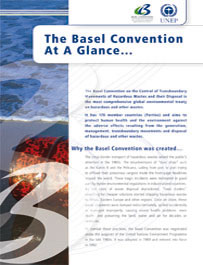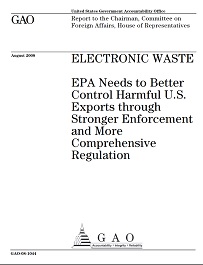E-Waste Government Responses

|
The Basel Convention on the Control of Transboundary Movements of Hazardous Wastes and Their Disposal, usually known as the Basel Convention, is an international treaty that was designed to reduce the movements of hazardous waste between nations, and specifically to prevent transfer of hazardous waste from developed to less developed countries.
The Basel Convention on the Control of Transboundary Movements of Hazardous Wastes and Their Disposal, usually known as the Basel Convention, is an international treaty that was designed to reduce the movements of hazardous waste between nations, and specifically to prevent transfer of hazardous waste from developed to less developed countries.
The Basel Convention had been ratified by over 170 nations, with the exception of three: Haiti, Afghanistan and the United States.
The U.S. government has had two decades to become a party to the 1989 Basel Convention, which regulates the international trade and dumping of hazardous waste, but still has not ratified the agreement.
By refusing to implement Basel Ban measures, America can trade its e-waste to whomever it desires. Though the U.S. is still an OECD member, it is not bound to the OECD’s decision that requires Prior Informed Consent for hazardous waste trade and “prohibits exports if there is reason to believe that the wastes will not be handled in an environmentally sound manner.” In the words of the Basel Action Network, the United States has chosen to elevate the concerns of its industrial lobby over its own public and the international community, and its blatant disregard for the Basel Ban is considered an act of “bad faith.”
|
See More... |

|
GAO's August 2008 report examined (1) the fate of exported used electronics, (2) the effectiveness of regulatory controls over the export of these devices, and (3) options to strengthen federal regulation of exported used electronics. Among other things, GAO reviewed waste management surveys in developing countries, monitoring e-commerce Web sites, and posed as foreign Internet buyers of broken CRTs.
GAO's August 2008 report examined (1) the fate of exported used electronics, (2) the effectiveness of regulatory controls over the export of these devices, and (3) options to strengthen federal regulation of exported used electronics. Among other things, GAO reviewed waste management surveys in developing countries, monitoring e-commerce Web sites, and posed as foreign Internet buyers of broken CRTs.
In its August 2008 report, GAO recommended that EPA (1) develop a systematic plan to implement and enforce the CRT rule and (2) develop options to broaden its authority to address the export of other potentially harmful used electronic items. EPA expressed significant reservations with GAO’s findings and recommendations. GAO maintains, however, that they are fair and well supported.
|
See More... |
|

|
|